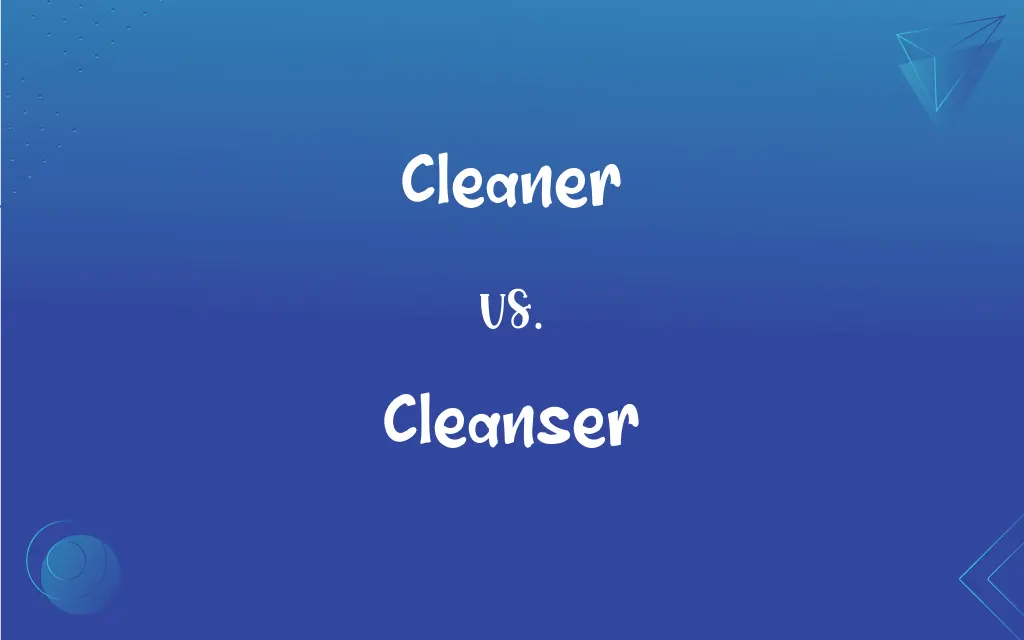Cleaner vs. Cleanser: What's the Difference?
Edited by Harlon Moss || By Janet White || Updated on October 2, 2023
"A cleaner is a substance or a person that cleans, while a cleanser is a product formulated to cleanse, especially the skin or another specific surface."

Key Differences
A cleaner can refer to both a substance used to clean various surfaces or a person whose occupation is to clean homes, buildings, or other spaces. It encompasses a wide range of cleaning agents that are used to remove dirt, stains, and other impurities from surfaces. A cleanser, however, is specifically a substance designed to clean a particular surface, usually the skin, by removing dirt, oil, makeup, and other impurities, often formulated to suit specific skin types or conditions.
Cleaners can be available in various forms such as liquids, powders, or sprays, and are often created to clean specific types of surfaces like glass, wood, or metal. They are ubiquitous and can be found in nearly every household or commercial cleaning supply closet. In contrast, cleansers are typically creams, foams, gels, or lotions, and are usually associated with skincare, used to clean the face or body, emphasizing a gentle approach to avoid damaging the skin.
The term cleaner, when referring to a person, denotes an individual employed to maintain cleanliness in a designated area or structure, performing tasks such as sweeping, dusting, and mopping. Cleanser, in contrast, does not refer to a person or occupation but strictly to a cleaning product, predominantly used in the context of skincare or personal care, and is not associated with the cleaning profession.
Cleaners, in terms of substances, are typically stronger and may contain harsh chemicals to effectively remove stubborn stains and dirt from various surfaces. They are essential for maintaining hygiene in homes and workplaces. Cleansers, conversely, are formulated to be gentler, focusing on removing impurities without stripping the skin or the specific surface of its natural oils, prioritizing the preservation of the natural balance and health of the skin or surface being cleansed.
The effectiveness of a cleaner is usually judged by its ability to remove dirt and stains efficiently from a variety of surfaces, leaving them clean and sanitized. In contrast, the effectiveness of a cleanser is often evaluated by its ability to clean without causing irritation or harm, providing a clean, refreshed feeling while maintaining the integrity of the skin or the specific surface.
ADVERTISEMENT
Comparison Chart
Usage
Used for cleaning surfaces or, as a person, performing cleaning tasks.
Specifically formulated to clean skin or specific surfaces gently.
Form
Can be a liquid, powder, or spray.
Usually a cream, foam, gel, or lotion.
Reference
Refers to both substances and individuals in the cleaning profession.
Strictly refers to cleaning substances.
Application
Used for various surfaces and materials.
Used primarily on skin or specific surfaces requiring gentle care.
Strength
Typically stronger and may contain harsh chemicals.
Formulated to be gentler on the surface it cleans.
ADVERTISEMENT
Cleaner and Cleanser Definitions
Cleaner
A substance used to remove dirt and impurities.
I use a multi-surface cleaner for my kitchen counters.
Cleanser
A product designed to clean the skin or body gently.
This facial cleanser removes makeup and impurities without drying the skin.
Cleaner
An individual or substance that removes unwanted elements.
A vacuum cleaner is essential for maintaining clean floors.
Cleanser
A cleaning product designed to maintain the natural balance of the skin.
A balanced cleanser preserves the skin's natural oils.
Cleaner
An agent used to sanitize and disinfect surfaces.
This cleaner eliminates 99.9% of germs and bacteria.
Cleanser
A substance formulated to cleanse specific surfaces without causing damage.
Use a gentle cleanser for cleaning delicate fabrics.
Cleaner
A person whose job is to clean buildings or other spaces.
The cleaner comes twice a week to tidy up the office.
Cleanser
An agent used to remove dirt and impurities from specific surfaces delicately.
A specialized cleanser is recommended for cleaning marble surfaces.
Cleaner
A product used to maintain cleanliness and hygiene.
We need a stronger cleaner to remove these stains.
Cleanser
A gentle cleaning agent, often used in skincare.
A mild cleanser is essential for sensitive skin.
Cleaner
One whose work or business is cleaning.
Cleanser
A detergent, powder, or other chemical agent that removes dirt, grease, or stains.
Cleaner
A machine or substance used in cleaning.
Cleanser
A skin lotion or cream that is used to clean the face.
Cleaner
Often cleaners A dry-cleaning establishment
Dropped off the stained shirt at the cleaners.
Cleanser
Something that cleanses, such as a detergent.
Cleaner
A person whose occupation is to clean floors, windows and other things.
Cleanser
One who, or that which, cleanses; especially, a detergent or other preparation used for cleaning.
Cleaner
A device that cleans, such as the vacuum cleaner.
Cleanser
A preparation used in cleaning something
Cleaner
A substance used for cleaning, a cleaning agent.
Cleaner
(in the plural) A professional laundry or dry cleaner business. This form is now interpreted as plural and usually spelled without an apostrophe, even in official usage, to justify the removal of the apostrophe. It was traditionally spelled cleaner's with an apostrophe because this is grammatically correct, as can be seen with forms such as go to the doctor's, which cannot be reinterpreted as plural.
I'll have to take this shirt to the cleaners.
Cleaner
One who, or that which, cleans.
Cleaner
A preparation used in cleaning something
Cleaner
The operator of dry-cleaning establishment
Cleaner
Someone whose occupation is cleaning
FAQs
Is a cleanser typically used for skincare?
Yes, cleansers are typically used for cleaning the skin, particularly the face.
Can a cleaner also refer to a person?
Yes, a cleaner can refer to a person whose job is to clean.
Can cleansers come in different forms like creams or gels?
Yes, cleansers can come in various forms like creams, gels, foams, or lotions.
Should cleansers be rinsed off after application?
Typically, cleansers should be rinsed off, but some leave-on formulations do not require rinsing.
Are cleaners typically stronger than cleansers?
Generally, cleaners can be stronger and may contain harsher chemicals than cleansers.
Is a cleaner used for removing dirt?
Yes, a cleaner is used to remove dirt, stains, and impurities from surfaces.
Is a cleanser specifically designed for gentle cleaning?
Yes, a cleanser is designed for gentle cleaning, often for the skin or delicate surfaces.
Can a cleaner sanitize surfaces?
Yes, many cleaners have sanitizing properties to kill germs and bacteria.
Are all cleansers mild and gentle?
While cleansers are designed to be gentle, their mildness can vary, and some may be stronger than others.
Are cleaners only available in liquid form?
No, cleaners can be available in various forms like liquids, powders, or sprays.
Can using the wrong cleanser harm the skin?
Yes, using the wrong cleanser can cause irritation, dryness, or other skin issues.
Can the term cleaner refer to products like vacuum cleaners?
Yes, the term cleaner can refer to devices like vacuum cleaners that are used for cleaning.
Do cleaners have a broader application than cleansers?
Yes, cleaners have a broader application, suitable for various surfaces, while cleansers are for specific surfaces or skin.
Can cleansers also clean surfaces other than skin?
Yes, some cleansers are formulated to clean specific surfaces gently, such as delicate fabrics or sensitive materials.
Is it essential to choose a cleanser that suits the skin type?
Yes, it is crucial to select a cleanser that is suitable for one's skin type to avoid irritation.
Are all cleaners harmful to the skin?
Not all cleaners are harmful, but some may contain chemicals that can irritate the skin.
Do cleaners need to be diluted before use?
Some cleaners need to be diluted as per the instructions, while others can be used directly.
Is it necessary to moisturize the skin after using a cleanser?
It is often recommended to moisturize the skin after using a cleanser to maintain skin hydration.
Can cleaner remove stubborn stains?
Yes, many cleaners are formulated to remove stubborn stains effectively.
Is it necessary to use a cleanser every day?
It is generally beneficial to use a cleanser daily to maintain skin cleanliness and health.
About Author
Written by
Janet WhiteJanet White has been an esteemed writer and blogger for Difference Wiki. Holding a Master's degree in Science and Medical Journalism from the prestigious Boston University, she has consistently demonstrated her expertise and passion for her field. When she's not immersed in her work, Janet relishes her time exercising, delving into a good book, and cherishing moments with friends and family.
Edited by
Harlon MossHarlon is a seasoned quality moderator and accomplished content writer for Difference Wiki. An alumnus of the prestigious University of California, he earned his degree in Computer Science. Leveraging his academic background, Harlon brings a meticulous and informed perspective to his work, ensuring content accuracy and excellence.































































